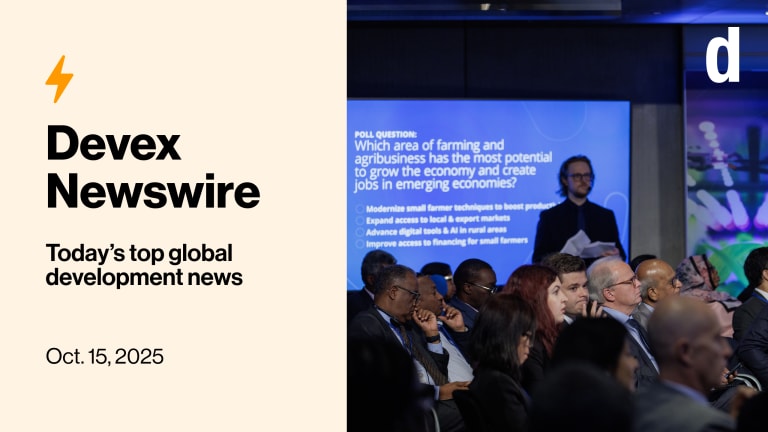
Launched just over a year ago, the New Alliance for Food Security and Nutrition is a global partnership formed by G8 governments, the private sector and African leaders with the goal of lifting 50 million people out of poverty by 2022. The combination of donor commitments, private sector investments and policy reforms by African governments are setting conditions for public-private partnerships to spark agriculture transformation.
But civil society organizations have argued that PPPs are not a suitable instrument for supporting family farms, which represent the basis of African food security. More recently, this chorus has gotten louder with warnings about the New Alliance facilitating land grabs, a new wave of colonialism and an imperialist scramble for Africa.
As G8 leaders gather in Northern Ireland this week, they must not only counter this narrative but go further to demonstrate how the role of the private sector in the New Alliance is empowering smallholder farmers.
According to the New Alliance Progress Report, the initiative is making a positive impact on the ground.
Ninety-one percent of donor commitments have been dispersed on time and more than half the $3 billion in private sector investments have broken ground. Out of the 97 policy commitments pledged, 55 are underway and 27 have been completed, from the expansion of a warehouse receipts system in Ethiopia to the provision of seeds and fertilizer to women farmers in Burkina Faso to other achievements in Ghana, Tanzania, Mozambique and Côte d’Ivoire.
The alliance is also expanding, with Nigeria, Benin and Malawi signing up at a pre-G8 Nutrition meeting this month.
So why do critics charge that these big commercial agriculture investments are eroding biodiversity, displacing communities, marginalizing farmers and facilitating corruption?
An FAO report has found a lack of “checks and balances” in land negotiations in Africa, which creates a breeding ground for corruption. Additional studies reveal weak consultation between governments and investors on the one hand and communities on the other.
Women, pastoralists, and those who migrate as a result of projects are often not involved in decision-making and compensation – although required by law in some countries - is considered inadequate to restore livelihoods.
The National Peasant Organization of Mozambique opposes large-scale Brazilian and Japanese investments in an agriculture corridor in that country, which they argue will cause social upheaval, corruption, water pollution and soil degradation.
The government of Tanzania – to its credit –acknowledges that the country’s unclear land law “places villages at risk of loss of land, use rights, and potential revenue or other benefits.” Given the history of natural resource extraction in Africa, it would be naïve to ignore the potential negative impact of New Alliance investments.
But what the critics miss is that the New Alliance, rather than facilitating land grabs, is in fact tackling the institutional problems that allow them to occur.
Burkina Faso is strengthening national and rural land agencies, increasing land certificates in village territories, and creating a policy framework for resettlement. Côte d’Ivoire is expanding land information systems and access to land for women and youth. Ethiopia is creating a one-stop shop for investors and accelerating land titling Mozambique’s reforms will increase land access for smallholder farmers (both women and men). Ghana is creating a land database to guide investors while organizing workshops with farmers and communities on the investment process. Tanzania is demarcating land across its Southern Agriculture Growth Corridor and clarifying the roles of the numerous agencies involved in land.
In the run up to the G8 Summit, the U.K. government is leading an effort to increase transparency in land transactions. It will seek to strengthen the use of the Voluntary Guidelines on the Responsible Governance of Tenure of Land, Fisheries and Forests that has been endorsed in New Alliance Cooperative Agreements.
If successful, these efforts could make transparent rights and obligations for citizens, investors and governments alike in land dealings. Without such reforms, both companies and farmers will remain reluctant to invest.
In Mali and Kenya, for example, confusing land procedures and ambiguous ownership make farmers less likely to upgrade their operations. Why take-out a loan to buy hybrid seeds or fertilizer when your land can be sold to others without your consent? Under these conditions, there is little incentive for rural farmers to organize through cooperatives where they can better negotiate with traders and exchange farming practices.
New Alliance naysayers see policy reforms aimed at “incentivizing the private sector” and call it a multinational corporate takeover of African agriculture. But the New Alliance Cooperative Agreements and corporate letters of intent define the private sector as more than just multinationals. The alliance includes African businesses, small and medium-sized enterprises, and smallholder farmers.
Based on a recent analysis conducted by ONE, African companies account for a substantial number of the overall projects and a few of the largest ones in dollar terms. Just over a third of the companies involved are SMEs.
Rather than displacing smallholder farmers, the New Alliance partners seek to integrate them into agriculture value chains. The success of the initiative will hinge on empowering these farmers, given that most African farmers own less than five hectares of land and that the agricultural sector remains the largest source of income for continent’s poorest.
The alliance aims to create a “glide path” for farmers to move from low-input/low-output subsistence agriculture to increasingly diversified, productive, market-oriented production and the generation of off-farm and on-farm income. The reality, however, is that most African farmers are not business ready.
This intersection of business and smallholder farmers is where transformational partnerships become critical.
Companies know how to build supply chains and create jobs, but are often unfamiliar with working with smallholders. Donors and NGOs bring technical assistance, patient capital and experience working in at the community level, but often lack industry-specific know-how. African governments play a role in infrastructure investment and setting regulation and trade policies.
The New Alliance brings these actors together in a targeted manner to galvanize agriculture transformation at two levels. At the policy-dialogue level, the Cooperative Agreements and Leadership Council drive accountability for financial and policy commitments.
At the transaction level, partners are working with smallholders to provide inputs like seed varieties and fertilizer; to facilitate business services, including finance, leasing, and insurance; to enhance production through training, processing, and technology transfer; and to support infrastructure around storage, irrigation and distribution.
One example of a strategic and successful partnership is the African Cashew Initiative, which brings together German Federal Ministry for Economic Cooperation and Development, the Gates Foundation, the African Cashew Alliance, FairMatchSupport (a Dutch non-profit organization), TechnoServe and five New Alliance countries.
The results so far are impressive. Since 2009, the partnership has trained more than 240,000 cashew farmers, cashew quality has increased, and farmers have forged direct links to processors. The combined income of cashew farmers in the five participating countries has risen by five million dollars, and nearly 3,100 new jobs have been created in the processing industry.
But transformation is not easy. Governments can be weary of the intentions of business. Businesses often are suspicious of government. Distrust prevails, and corruption exacerbates it. Smallholder farmers often operate in the informal economy with limited access to capital, technology or assets.
At the policy-dialogue level, the alliance has to ensure country-level leadership drives a new kind of dialogue that departs from typical bilateral government-to-government negotiations and engages with civil society organizations.
High-level country commitments have been positive, but not all governments have engaged the line ministries and local governments enough to truly gain traction. Leaders in second-tier cities will be critical to developing wholesale markets and defragmenting value chains.
Some contend the source of the problem is that the New Alliance is not sufficiently in synch with local agriculture plans, such as the Comprehensive Africa Agriculture Development Program, or CAADP. These critics are right: If the New Alliance fails to become embedded in local budgeting, planning and policymaking with civil society engagement, it will not be sustainable.
It’s clear the alliance is not a corporate boogeyman. Smallholders are being connected to markets and generating incomes because of it. The New Alliance Accountability Framework, which is expected to be released around the G8 Summit, will track progress under specific indicators at multiple levels. It aims to better understand the links between investment, policy change and agriculture growth and other outcomes like food security, nutrition, and women’s economic empowerment.
According to a draft version of the framework, in each New Alliance country, a local “responsible body” – an existing department or coordinating body - will coordinate, drive, and track activities. These entities will facilitate dialogues among partners including civil society and ensure donor, private sector and African government commitments are fulfilled. These local entities will report to the Leadership Council and other external stakeholders.
The alliance will be getting new management as it is further embedded into local institutions and processes. The governance of the effort so far has resulted in partnerships that pursue inclusive business models. Local public and private sector leaders who will advance the alliance through a “responsible body” must ensure that this continues and must become ambassadors for trust-building across sectors.
This is the hard part. If the transition is not managed carefully, New Alliance investments could get entangled in corruption, social dislocation, and environmental degradation. For instance, some alliance country governments are less enthusiastic about defending the rights of pastoralists.
G8 donors and other partners can help, but at the end of the day, alliance countries will determine their own path to agriculture transformation. In the absence of strong local leadership, they risk proving the New Alliance naysayers right.
Explore related content:
Join Devex, the largest online community for international development, to network with peers, discover talent and forge new partnerships - it’s free! Then sign up for the Devex Impact newsletter to receive cutting-edge news and analysis every month on the intersection of business and development.








